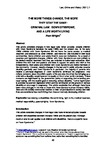The More Things Change, The More They Stay The Same: Criminal Law, Down Syndrome, and a Life Worth Living
| dc.contributor.author | Wright, Fran | |
| dc.date.accessioned | 2017-03-20T17:12:23Z | |
| dc.date.accessioned | 2017-04-11T08:23:41Z | |
| dc.date.available | 2017-03-20T17:12:23Z | |
| dc.date.available | 2017-04-11T08:23:41Z | |
| dc.date.issued | 2011 | |
| dc.identifier.citation |
Wright, F. (2011) 'The More Things Change, The More They Stay The Same: Criminal Law, Down Syndrome, and a Life Worth Living', Law, Crime and History, 1(1), pp.62-85. Available at: https://pearl.plymouth.ac.uk/handle/10026.1/8858 | en_US |
| dc.identifier.issn | 2045-9238 | |
| dc.identifier.uri | http://hdl.handle.net/10026.1/8858 | |
| dc.description.abstract |
This article considers changes in how legal rules reflect attitudes towards children with Down Syndrome between the early 1980s and the present day. In the early 1980s children with Down Syndrome did not have the same access to medical treatment and education as other children, and were not fully included in their local communities. Some children and adults lived in state-run institutions. As a result of case-law and legislative changes, children with Down Syndrome are now unlikely to be denied medical treatment and they are included in mainstream education. Most children live with their own parents and there is support for adults who wish to live independently. Both adults and children with Down Syndrome are visible members of the community. However, despite changes in the law and in public attitudes towards disability generally and Down Syndrome in particular, the majority of parents who receive a pre-natal diagnosis of Down Syndrome terminate the pregnancy. This reflects concerns about the child's quality of life and also the effect that bringing up a child with a disability would have on the quality of life of other family members. These concerns are legitimated by the government policy of supporting and extending pre-natal testing, with the explicit goal of detecting serious disability. Further legitimation is provided by abortion legislation which permits termination on the ground of serious disability at any stage in pregnancy. The article concludes that although there have been many changes in the lives of those with Down Syndrome since the early 1980s, there are still socially constructed barriers to their full participation in society and their lives are considered less worth living than those of normally developing children. | en_US |
| dc.language.iso | en | en_US |
| dc.publisher | University of Plymouth | |
| dc.rights | Attribution 4.0 International (CC BY 4.0) | * |
| dc.rights.uri | https://creativecommons.org/licenses/by/4.0/ | * |
| dc.subject | law relating to disabilities | en_US |
| dc.subject | life worth living | en_US |
| dc.subject | right to life | en_US |
| dc.subject | medical treatment | en_US |
| dc.subject | medical responsibility | en_US |
| dc.subject | parental rights | en_US |
| dc.subject | Down Syndrome | en_US |
| dc.title | The More Things Change, The More They Stay The Same: Criminal Law, Down Syndrome, and a Life Worth Living | en_US |
| dc.type | Article | en_US |
| dc.type | Article | |
| plymouth.issue | 1 | |
| plymouth.volume | 1 | |
| plymouth.journal | SOLON Law, Crime and History |



